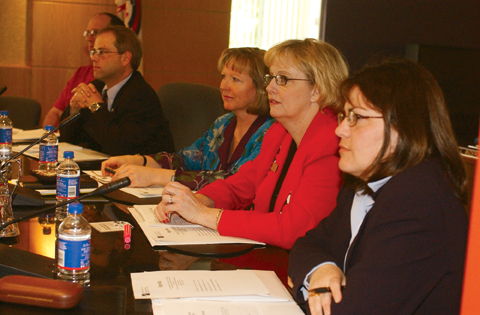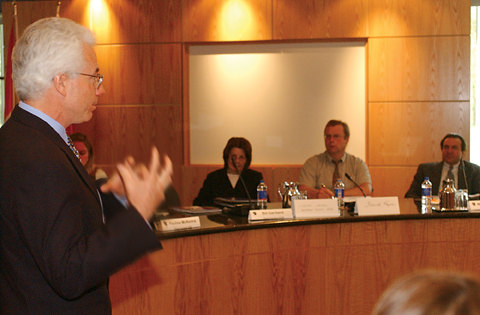|
by Brian
Jamieson
Chaotic. Messy. Challenging. Exhausting. Intense. These are among the
adjectives used by Ontario's newest teachers when describing the complex
experience of their first year teaching. The words had come up in the
College's Transition to Teaching study of first- and second-year
teachers and they were reiterated during a series of consultations on
the College's white paper New Teacher Induction: Growing into the Profession
during May and June this year.
Deputy Registrar Brian McGowan consulted with new teachers and board administrators
in Hamilton, Windsor, Toronto, Ottawa, Sudbury and Thunder Bay this spring.
McGowan and a team from the College met to gather reaction and input regarding
the College's white paper proposal for a fully funded, government-mandated,
two-year pr-ogram of support for novice teache-rs in every Ontario school
board.
Novice educators and school board representatives - including principals,
supervisory officers, parents and administrators - expressed a desire
to help those new to the profession to become comfortable, confident and
successful quickly.
"If you improve teaching practice, you improve student learning,"
says McGowan.
The College's induction paper calls for one-on-one mentoring - pairi-ng
an experienced teacher with a new one to provide support and encouragement
during their critical first years of teaching.
The paper builds on the College's educational research, data from its
Transition to Teaching study and interaction with members over
the last several years. Components of the proposal include mentoring,
professional development, structured orientation, recognition and program
evaluation, as well as recognition of the need for release time. (Click
here to view a copy of New
Teacher Induction:Growing into the Profession.)
The right start
 "The
College initiated the proposal and discussion on induction to ensure that
new teachers get the right start in what we hope will be long, satisfying
careers as teaching professionals," said McGowan. "This is part
of the continuum of professional development that begins in the faculties
and continues on the job, in the classroom. "The
College initiated the proposal and discussion on induction to ensure that
new teachers get the right start in what we hope will be long, satisfying
careers as teaching professionals," said McGowan. "This is part
of the continuum of professional development that begins in the faculties
and continues on the job, in the classroom.
"We want the people who have made a commitment to students to feel
our commitment to their professional growth and development. The more
quickly they become comfortable in the classroom, the more confident they
will be as teaching professionals. All of this can only improve learning
for Ontario's students."
The College's consultation process showed that Ontario's administrators
and teachers strongly supported a recommended two-year commitment to new
teacher support. But many suggestions were made that would refine the
proposal.
It was suggested that smaller and remote school communities might require
different models of induction. Some thought recently retired teachers
should be invited to act as mentors.
Others suggested clustering several new teachers with a single veteran.
Cautions were raised about the selection and assignment of mentors and
the need of a process to reassess and reassign those involved in unproductive
partnerships.
Consensus, however, was clear on one point. "Boards can't do this
without the funding," as one Hamilton-area educator said.
Dollars and sense
The funding model proposed in the white paper put a price tag of $40 million
on new teacher induction. The figure and the model raised various questions
and the observation that the estimate was low.
During consultations, it was pointed out that the rate for mentor training
would need to be increased.
Several board administrators also noted that some accommodation would
need to be made for a board-level induction program co-ordinator.
Not surprisingly, teachers praised the induction paper's recommendation
of an $850 allotment for each new teacher for professional development
opportunities for each of the two years.
Special Education was identified as a priority area for early professional
development. Support for fully funded mentor training was accompanied
by a recommendation that this training should be paid and undertaken in
the summer, outside of the regular school year. Mentor training, in fact,
was considered essential.
"Until we come up with the resources, we're paying lip service to
the program," another Hamilton-area administrator said.
Nuts and bolts
 The most
consistent feedback requested for local flexibility to determine the program
at the board and school level and the assertion that provincial funding
for induction be new, sufficient, restricted to induction and sustained. The most
consistent feedback requested for local flexibility to determine the program
at the board and school level and the assertion that provincial funding
for induction be new, sufficient, restricted to induction and sustained.
Teachers and administrators agreed that to succeed an induction program
must provide release time for mentors and protegés. The College's
paper recommends that mentors and new teachers receive significant release
time for ongoing mentoring activities and professional development.
Novice teachers noted that the additional work required in preparation
for being out of the classroom - to prepare supply teachers to take their
places - could in fact be an added stress.
There were additional concerns: the availability of supply teachers to
cover the needs of the program and the reduction of experienced teachers'
time in their classrooms.
Some suggested the merits of job shadowing and observation as a means
of reducing the need for supply teachers and for its own sake. "Some
of the best teaching can happen after new teachers visit an exemplary
classroom," one Toronto-area administrator noted.
At a provincial stakeholders' consultation in Toronto, one participant
suggested creating an "orientation buddy" system to enable mentoring
relationships to occur informally during orientation and to allow either
partner to save face if the relationship didn't work.
All novice teachers who had received board-level orientation (only one
in four do, according to the College's Transition to Teaching study)
appreciated it. They felt, however, that orientation to school staff,
resources and procedures was just as important.
Long-term occasional teachers and those hired after September or later
in the school year also cited the importance of proper orientation. Many
said they felt isolated and unsupported during their initial placements.
New teachers said they struggled with teaching split-grade classes, subjects
outside their areas of expertise and EQAO testing responsibilities. They
also expressed concerns about inadequate classroom supplies.
The College's proposal recommends that teachers receive the curriculum
resources they need and that they be given teaching and classroom assignments
that suit their qualifications and experience
Those consulted strongly stated that induction programs and not the participants
be evaluated. Several thought that induction should be tied to school
improvement plans. They also said that more needs to be done to acknowledge
the challenging and complex nature of teaching in general.
Multiple benefits
During the course of consultations, many who had come to teaching as a
second or third career said they had no idea how difficult - or satisfying
- it would be.
"I had more satisfying moments in my first year of teaching than
I had in 10 years in the private sector," said one Toronto-area teacher.
Ottawa educators whose schools had mentoring programs spoke about their
value to school culture. Both veteran and novice teachers benefited from
the partnerships, they said.
"Mentoring improves my teaching too," said one secondary school
teacher. "As far as my own lifelong learning, it's the key component
right now."
"Mentoring builds support systems, collegiality and networks,"
said an attendee at one of the Toronto sessions.
Implementation challenge
Stakeholder representatives from educational organizations and teacher
federations supported the proposal while pointing out many implications
and operational challenges that will need to be addressed for its effective
implementation.
"This is an opportunity to provide models for schools to support
new teachers at whatever time they come into a school," said Helen
Spence, president of the Ontario Principals' Council. "It can be
done and can be done well."
However, respondents noted a cultural change in schools will be required.
School administrators must be brought on board and supported because many
principals and vice-principals are themselves new to the positions.
"We have to find ways to support new teachers and give them permission
to say, 'I feel overwhelmed.'" said Sue Robertson, a representative
of the Ontario Federation of Home and School Associations. "They
need someone to talk with every day about the challenges."
Not surprisingly, participants in the consultation process raised many
related issues. Some wondered how an induction program would be connected
to the Professional Learning Program, how new teacher would be defined
and whether there was merit in expanding the Bachelor of Education program
at Ontario's faculties of education.
Face-to-face feedback as well as submissions made via the College web
site were reviewed this summer and incorporated in a rewrite of the induction
paper. The revised paper is to be presented to College Council at the
end of September. Pending Council approval, this final paper with recommendations
will be presented to the Minister of Education later this fall.
New Teacher Induction:
Growing into the Profession is available, and upon approval the final
proposal will be posted, on the College web site at www.oct.ca.
|


